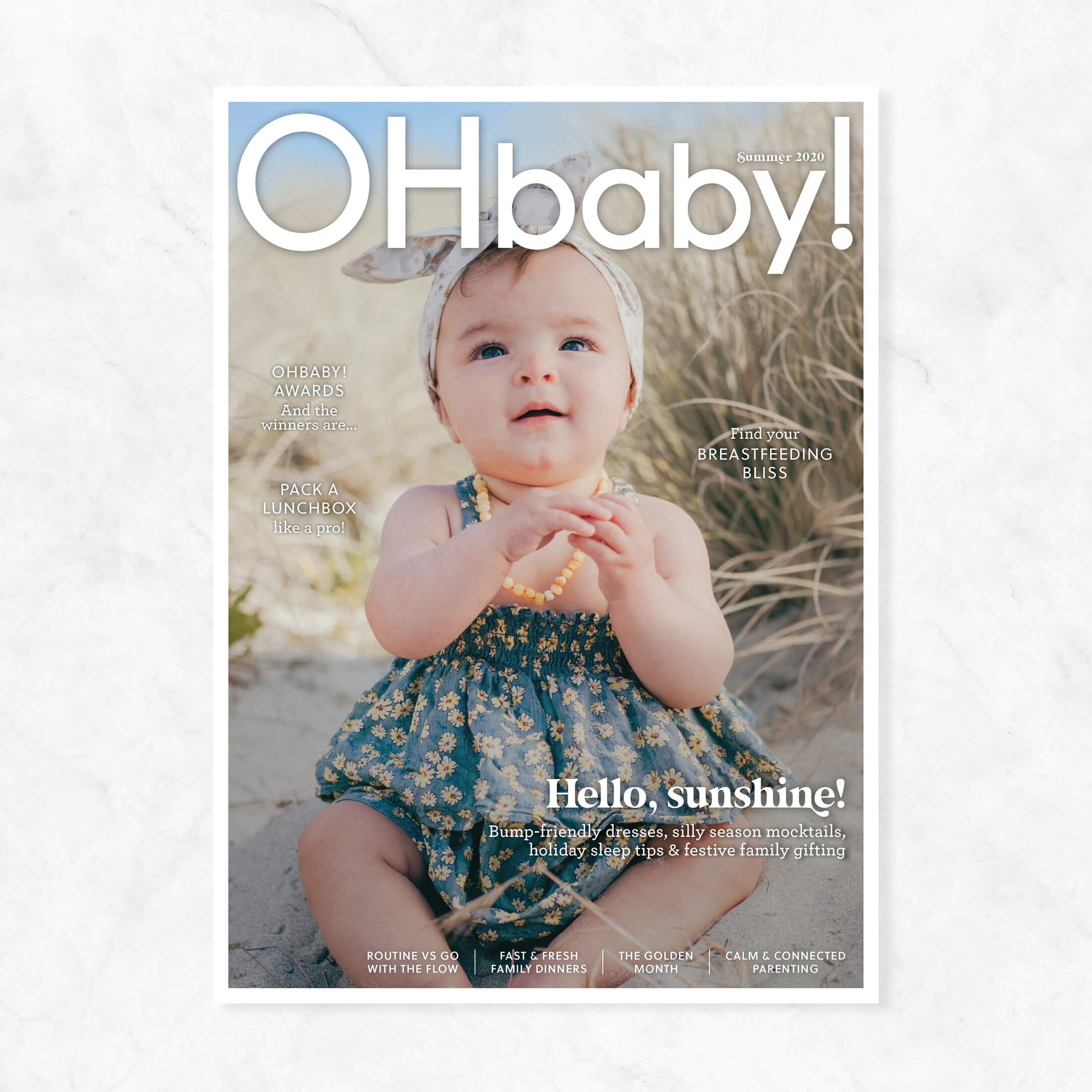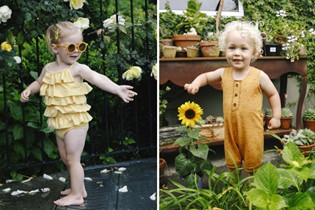How do you know when to choose routine over go-with-the-flow?

How do you know when to choose routine over go-with-the-flow? Miriam McCaleb shares some insights.
Once upon a time, a family welcomed a baby ... and everything changed.
In reality, this once-upon-a-time happens time after time. And while the families welcoming those babies can look really different – big or small, in different homes, with different noises, different values and different favourite sports teams – it’s hard to find a parent whose world wasn’t changed by the arrival of their baby.
There are practical changes, such as the lack of sleep and time to ourselves. It can be a shock to go from being in charge of our own time, of something as seemingly simple as our own morning routine, to suddenly … NOT. Overnight we find ourselves living with a needy little someone who doesn’t yet grasp the difference between day and night.
It can be overwhelming caring for a small person with an immature system of regulation, which means that they can’t always manage the feelings of discomfort that accompany tiredness. Or hunger. Or cold. Or…
Patience helps. And trust. Trust your baby to tell you what they need. Trust yourself to understand (or to learn to understand) Baby’s communications. She will use her face, her body and her vocalisations to let you know how things are going for her as she works to make sense of this new world.
Remember: It’s all brand new for babies
This can be a mind-blowing concept, but I encourage you to sit with it for a minute. While it’s true that some aspects of our world will have filtered through to your baby during her time in your body (like some awareness of sound and light), basically, it’s all new. Every tiny thing is novel to babies – the feeling of air, fabric, or your touch on their skin … that’s new. The taste of milk – new. The sensations of hunger are new, as is the squintiness of bright light. Crying is new, gravity is new, even breathing – new!
With this in mind, we'd do well to take it easy in the early days, meeting ngā pēpi exactly where they are. They are in a vulnerable state of learning and becoming, where the newness of everything can be overwhelming.
A lucky baby is one who is born into a family who make space for all these new experiences. The bare minimum of our daily lives – food, sleep, bathing, laundry – this is plenty for a young baby to make sense of. At first, babies need to be allowed to concentrate on their significant relationships and slowly figure out some basics about our world. Like understanding the difference between night and day.
It will take time to get from hither to yon
I’m returning to that idea of night and day because it would seem that all new parents can be pretty preoccupied by thoughts of sleep.
Take heart, dear friends, because all babies will sleep. Everyone sleeps. I’m here from the future to tell you that there is likely to come a day when your early riser may have to be hauled out of bed!
So how does a parent get there? How do we get from caring for a tiny, swaddled night owl to parenting a sleeping, pyjamaed lark?
The answer is: slowly. Patiently. With as many daytime naps as you can manage to stay sane in the meantime.
The other part of the answer is: by embracing the beauty of consistent and predictable routines. There is a good reason for the magical formula of BJB (bath, jarmies, bed). Over time, repetition of this sequence (or whatever sequence works in your house) will create in your baby an understanding and an expectation of what comes next. Work a couple of familiar songs into that routine to further anchor the expectation and you’ll be well on your way.

Yup, routines are great, but they're not everything
Remember though, rushing to strict schedules can be unhelpful with brand new babies. Give your baby – and yourself! – permission to take time figuring one another out, and trust that you’ll sort out some consistent patterns that work. Eventually.
And once you do figure out a set of routines that serve you, do your darnedest to keep a soft grasp on them. Be ready to adapt them if they no longer work; allow yourself to abandon them upon occasion. A random late night at Nana’s won’t derail your entire life, I promise.
I say that speaking as a massive fan of routines and predictability. Full disclosure: I used to think the world might end if my firstborn experienced any kind of deviation from routine. To this day, I have to be careful that I don’t become too rigid in the way I run our home. I love and need my daily/weekly rhythms, but there is such a thing as overdependence on routine, and inflexibility isn’t ideal.
Sticking to the script without exception can lead to missing out on opportunities to be spontaneous, fun and responsive.
A word about responsiveness
Early in a babe’s life, responsiveness is super important. Being responsive means listening for a baby’s cues and then responding appropriately (eg hunger = provide milk). Being responsive is the opposite of 'feed every four hours no matter what'. Providing responsive care acknowledges that growth spurts happen – sometimes babies need feeding all the flippin’ time! – or that some days they're sleepier than others.
Providing responsive care can keep us on our toes, but it’s a real gift to infants. Developmentally, it sets them up for a secure attachment relationship, which is truly the foundation of, well, everything.
The reciprocal dance between a baby and their significant other teaches them what it is to be in relationships. The face-to-face give-and-take of smiles, the shared gazes and baby chats, these things literally build a baby’s brain. These interactional sparks of relationship magic cause a flood of feel-good hormones that are great for adult and baby. Cuddling and talking to babies builds a strong neurological foundation that points to optimal development.
So we do well when we strive to be responsive to our very young babies, even as we ease them toward predictable and consistent routines. But we’re not addicted to our routines – wouldn’t it be nice to be the sort of parent who knows how to have fun and be spontaneous too?
Fun, spontaneity … chaos?
Like everything in life, our ability to be spontaneous and have fun can depend on a whole slew of things – such as how old the children are, the temperaments of kids and parents, what work deadlines are looming that week, how healthy everyone is, and first and foremost, the old tiredness factor.
But if we can get comfortable with the idea that routines are beautiful, yet deviating from them is okay sometimes, we can stay open to opportunities to play.
Staying open acknowledges the following oxymoron: we can actually plan to be spontaneous. We can do that by doing things like keeping towels in the boot of the car for just in case. I always do that now, after reading the following yummy passage from Sarah Best’s gorgeous book Changing the World is Child’s Play:
'It was a clear-skied day, the first of spring. They drove home via the beach. Someone called out from the back seat, “Let’s stop”. Hmmm, that wasn’t really the plan. There was dinner to cook, there were jobs to do. But she chose to say, “Yes, let’s”. Pulling over, they hopped out of the car and opened the boot to retrieve the togs and towels that always lived there. Off they went to really experience this first glorious day of spring. Sand, shells, salty air, gentle sun, calm breeze and freezing water – yet they all went swimming. This time together was not forgotten, unlike all those other days of simply coming straight home and getting on with jobs.'
So we love routines, but we don’t want to be addicted to them. And we love spontaneity, but too much of that isn’t good either because it too easily leads to chaos. Yes, have whatever you want for dinner! Go to bed whenever you like!
Life in the middle of the River
Dr Dan Siegel is a professor, psychiatrist, writer and teacher, and he has a wonderful image that captures the middle ground – or in this case, water. Dr Siegel talks about life as being like a river. On one bank there is chaos, on the other bank there is rigidity. In the middle? What Dr Siegel calls the 'river of integration'. We can imagine our lives as one long ride down that river, trying not to spend too long on either the 'chaos' bank or the 'rigidity' bank.
That’s our challenge. To swim (or float!) in the middle. And remember, wee babies are starting off on the chaos bank. It’s all brand new for them, remember? So don’t go overboard by rushing them into inflexible routines on the rigidity bank.
Instead, help Baby to move to the middle of the river. Slowly, in the safe little boat of their relationship with you.
Believe it or not, if you aim for the middle of the river you’ll get into comfortable routines faster than if you rush to strict schedules. What’s more, you’ll have a better relationship with your baby, and you’ll be a wiser parent.
How to strive for routines that are predictable and yet flexible
- Start with slowing down. Babies operate on a different time frame than we do. Having a new baby is an invitation to drop the rush. With their immature systems of sensory integration, everything takes longer. Remember: trees make great mobiles, and babies who get to stare out the window are babies living their best lives!
- Observe your baby. The time you take for gazing at your infant is time well spent. The first weeks and months of a baby’s life are a chance to get to know one another. Close, attentive observation will teach you so much about how s/he experiences the world, and it gives your baby an immeasurable gift as they have time to observe you back. This is what secure attachments start with.
- As always, be kind to yourself. Some people will really struggle with those requests to slow down and gaze at Baby. And that’s okay. Please, please be kind to yourself if you find parenthood hard sometimes. I think we all do. Many people with new babies have never known a baby before, and if that’s you, aim for extra self-compassion in adjusting to life with this loveable hurricane.
- Try to remind yourself of the bird’s eye view of that river. We don’t want to live in chaos but we don’t want to live in concrete either. Now and then, check in with your imaginary boat on that river of integration. Bear in mind that you’ll have to spend some time on the chaos bank with your newborn, because we do have to meet babies where they are. That’s what responsive care is. Just try not to set up a permanent camp there. Our goal is for a sturdy vessel to sail down the middle – sometimes swinging this way or that – but striving for integration.
- Introduce routines that are about sequence, not time. Routines work best when they follow a consistent pattern, not the clock. There is nothing wrong with having a goal of getting everyone to sleep by a certain time, but that doesn’t always work. Dinner can run late, people make unscheduled visits, life happens! It can be more useful to work with that predictable pattern rather than with time (remember BJB?).
- Predictable rhythms help. Use familiar songs, consistent catch phrases. With really little babies, make your night feeds quiet and boring, keeping the room as dark as you can, and in the daytime: throw back the curtains and sing! This will really help Baby to figure out day/night, which will help you to get some sleep.
Miriam McCaleb is a researcher, writer and mother. She lives and works in North Canterbury. Visit her at babygeek.nz.

AS FEATURED IN ISSUE 52 OF OHbaby! MAGAZINE. CHECK OUT OTHER ARTICLES IN THIS ISSUE BELOW

















